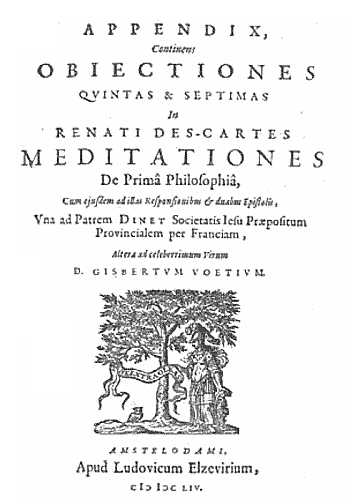In his sixth mediation, Rene Descartes’ Meditator turns his thoughts to his own body and mind - why does a certain feeling in his stomach make his mind decide to eat? Why does he feel pain and itches in his own form but nothing external to it? Thus began formally (for the idea has predecessors in ancient Greece and Asia) debate known as the ‘Mind-Body Problem’ between philosophers, and many psychologists, which carries on to today. The argument centers around the extent of the connection between the mind and the body - are they connected or separate? Does one control the other?

The cover of Descartes' Meditations of the First Philosophy, including his ideas on the mind and body.
Answers to this debate generally fall into one of two camps - monism, advocating a unification of mind and body, and dualism which claims the opposite. Within dualism, there exists Cartesian dualism which differentiates between a mental substance, which can think, and matter, which can occupy a place in space-time. They posit that the mind, being made of the former, is entirely different to the body which belongs to the latter. Property dualism asserts that the difference is purely ontological and non-reductive physicalism delivers a worldview where the mind and body are separate yet mental events are linked to, and possibly caused by physiological ones. Finally, many subscribe to Searle’s idea which draw from the last two, called biological naturalism, wherein he finds mental states ontologically incongruent with physical ones yet possible causally related to them.
On the monist side of the debate lies the camps of materialism where only matter is real and all else an as-yet undiscovered facet of this reality, and that of phenomenalism (also known as subjective idealism) which convey the opposite. Berkeley was a prominent proponent of phenomenalism as it pertained to his ideas of idealism in perception wherein things that are not perceived cease to exist in any meaningful way.
The discussion has seen considerable influence from religion, particularly on the dualist side, and continues to be a subject of hot debate.
© BrainMass Inc. brainmass.com June 30, 2024, 9:22 am ad1c9bdddf
